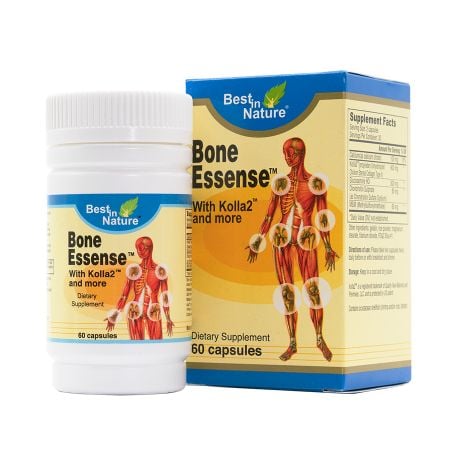
Glucosamine is in just about every supplement that purports to help with joint health or osteoarthritis. It’s not nearly as well-known or discussed as calcium and collagen so is there anything to it? Let’s discuss exactly what glucosamine is and whether it may help you retain or improve your mobility.
What is Glucosamine?
Glucosamine is a natural compound in cartilage, the tissue that cushions joints. It’s also used in the production of tendon and ligament tissue.
Supplemental glucosamine on the other hand, is harvested from the shells of shellfish or produced in a laboratory. As with calcium and magnesium, there are several forms of glucosamine: glucosamine sulfate, glucosamine hydrochloride and N-acetyl glucosamine.
Best in Nature’s Bone Essense is a complete Bone and Joint Health formula that provides glucosamine along with calcium, type II collagen and more. Learn about it here.
The forms of glucosamine
The forms of glucosamine differ slightly. But are largely similar.
Glucosamine sulfate
Glucosamine sulfate is the most widely used form in supplements and this form is the most used among those looking for relief from osteoarthritis. It’s derived from shellfish like crab, shrimp and lobster.
Glucosamine hydrochloride
This form is also often used in supplements and comes from similar sources as glucosamine sulfate. It has more glucosamine by weight compared to glucosamine sulfate but it also has more sodium.
N-acetyl glucosamine
The name refers to an acetyl group attached to the glucosamine molecule. There is less evidence to support the use of this form of glucosamine for osteoarthritis. But there is emerging research related to this form of glucosamine in relation to MS.
The Benefits of Glucosamine
Joint Health
Because glucosamine is a natural substance found in cartilage, many take it along with calcium and collagen to preserve or restore their joint comfort and mobility. The form that is most studied for this purpose is glucosamine sulfate in regard to two specific conditions.
Osteoarthritis
Some literature has positive findings about the use of glucosamine for the treatment of osteoarthritis with multiple studies finding that it significantly reduced pain, helped maintain joint space, and slowed disease progression over the course of the studies. However, overall data as of yet is inconclusive.
Rheumatoid arthritis
Unlike osteoarthritis, rheumatoid arthritis is an autoimmune condition in which one’s immune system attacks their joints. Researchers didn’t hypothesize that glucosamine would help but in a small scale study of 51 participants, glucosamine was self-reported to provide more relief than a placebo.
Safety and Interactions
Only mild side effects like headaches or stomach ache have been reported from those taking glucosamine.
Glucosamine supplements are often derived from shellfish so those with allergies should be aware. As a result, glucosamine might not be suitable for those following a vegan diet either.
If you have a shellfish allergy or are vegan, there are varieties of glucosamine derived from cow, pig or fungus.
In terms of health effects, it might affect blood sugar levels. Drug interactions to be aware of include that glucosamine can make pain relievers like Tylenol less effective and oppositely can make anticoagulants like Warfarin overly effective leading to a risk of internal bleeding. As a result, one should consult a physician before adding glucosamine to their regimen.
How to Take Glucosamine Supplements
As a supplement, there isn’t a consensus on a recommended daily intake. In studies, the respondents who reported the most relief from osteoarthritis symptoms took 1200 mg -1500 mg per day of glucosamine sulfate.
Bottom Line
Glucosamine is a natural compound found in cartilage. As a result, it’s been made into and taken as supplements to preserve or possibly restore these tissues. Studies are ongoing but participants in initial trials have reported decreased arthritis pain and with minimal side effects.
This article is provided for informational purposes only and is not intended to be used as medical advice. If you have immediate concerns about your health, please seek the help of your physician.





Validate your login
Sign In
Create New Account